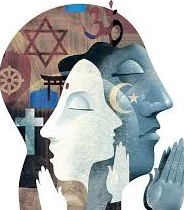
Are We Practical Atheists?
I recall reading that during the Cold War, at a time when the Soviet Union was officially atheist and religious practice was forbidden, Russians – even Communist party members – continued to use references to God in their daily conversations. They would say things like, “God protect us!” and “I swear to God.”
After nearly 70 years of living in a God-forbidden state, the Soviets still had these vestiges of religious belief in their vocabulary, unable or unwilling to get rid of them.
Interesting that Julie Drizin, a journalism teacher at the University of Maryland and professed atheist, describes a similar experience in an online article entitled, “I’m raising my kids atheist in a God-obsessed culture: How I learned to parent godless children.”
She finds herself using such terms as “God bless you!” “For God’s sake!” and “God forbid!” They’re part of her vernacular, she writes, even though “…God is not exactly welcome in our home.”
Most Americans, according to the polls, are not atheists but in practice, it’s sometimes hard to tell the difference between believers and non-believers. Drizin sees society awash in religion, and I suppose a non-believer, or those who don’t want to be reminded of God, may see it that way.
As Deep as a Miller Lite Commercial
But to my mind, much of the religion we see around us is as deep as the latest Miller Lite commercial. Many of us are culturally religious, and easily mix patriotism, consumerism and political ideology with faith, but we live as if God did not exist. We’re practical atheists.
And that may be a reason why many people wonder whether faith makes any difference.
Like Drizin and the Soviets, those of us searching for God may throw around “God” words and phrases, but God may not be exactly welcome in our lives either. We may forget that God is a surprise, unpredictable and no defender of the status quo. We may be looking for him/her in all the wrong places, or ignoring the obvious.
We may be unwilling to accept uncertainty, and use doubt as an excuse not to pray. We may be a little too quick to adopt a cynical attitude about others, finding excuses for not loving and helping them.
We may make political decisions based on political affiliations or simple bias, not on our faith or search for God. But most important for Christians, we may fail to recognize that God is present in everybody, including the Julie Drizins and Soviets of this world.
This is not an invitation for believers, or people searching for God, to beat up on themselves. We just need to ask occasionally whether we’re humble and honest about who we are and what we believe, trying to see ourselves and others as God may see us.
At the end of his book, “Patience with God: The Story of Zacchaeus Continuing in Us,” theologian and psychologist Tomas Halik – whom I’ve quoted often in these blogs – presents a fictitious dialogue between Jesus and Zacchaeus. In case you’ve forgotten, Zacchaeus is the height-challenged tax collector in the gospel of Luke who climbs a sycamore tree to get a better look at Jesus, the passing itinerant preacher.
To his surprise, Jesus asks him to come down from the tree, saying he wanted to stay the night in Zacchaeus’ house. The “groupies” following Jesus were apparently shocked at this development, seeing that Jesus would associate with such a known sinner. So probably for their sakes, Jesus speaks on Zacchaeus’ behalf, saying, that the “Son of Man came to seek and to save the lost.”
On the Fringes of Religion and Society
Zacchaeus was not a follower of Jesus and was on the fringes of religion and society because of his shameful occupation, and Halik uses him as a model for people who are confused and uncertain about faith and religion. He imagines a voice that arises “from Zacchaeus’ heart” many years after Zacchaeus’ encounter with Jesus.
“My words, my legacy, and my name,” Jesus tells Zacchaeus, “are entrusted to the lips of people who are never completely pure, to hearts in which love for me is always mixed with love for the self and for the things of this world.
“I gave myself to the faith of my church, which is made up of sinners, not angels, and I (am) also in those who are still far from its visible gates, those who are grimy and sweaty from their seeking and wandering along paths full of questions and doubts.
“And there’s another thing. Faith – if it’s a living faith – has to breathe; it has its days and its nights. God speaks not only through his words but also through his silence. He speaks to people not only through his closeness, but also through his remoteness.”


